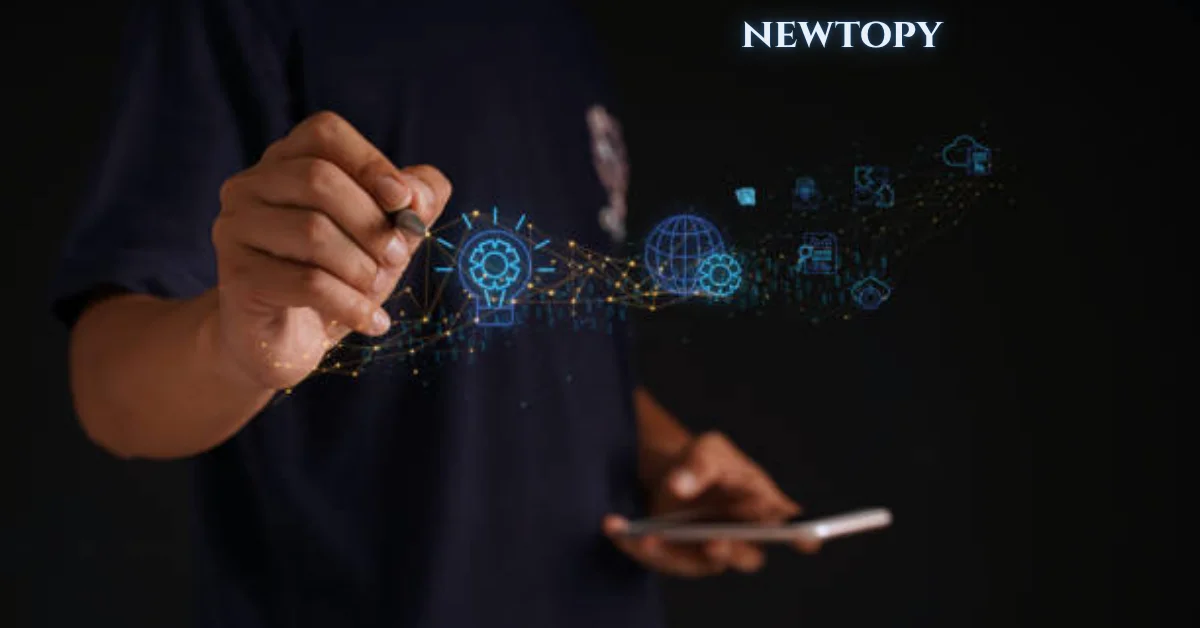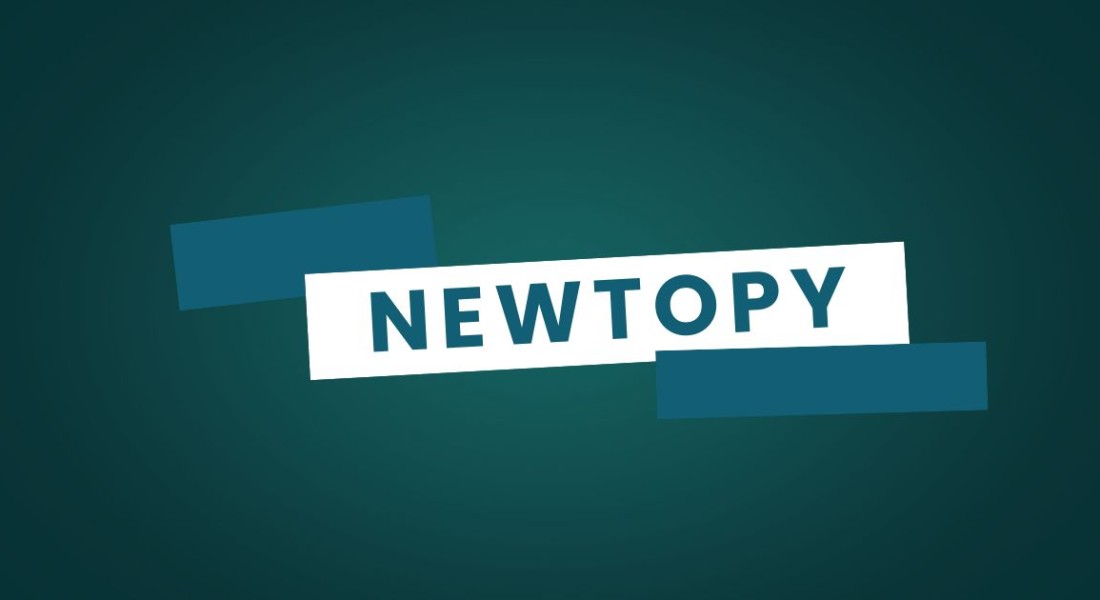This paper can be considered as the detailed examination of a digital phenomenon called Newtopy. The post is aimed at the readers interested in new tendencies of the internet evolution and future perspective of the internet, which Newtopy raises. The post goes into the beginnings, connotations, cultural effects, and possible problems with Newtopy. It is dedicated to decentralization, identity, creativity and community by giving a broad picture of what Newtopy stands in the contemporary rapidly transforming digital environment. As a developer, thinker, or digital explorer you are invited to join me in this article; seeking ways that we may create a more considered and inclusive digital future; one idea at a time.
Introduction
Amidst the looking glass of the dynamic and expansive world of digital innovation, we find some concepts developing in the main stream and causing high alert in the virtual community. Newtopy, is one of such terms that has just started to creates some ripples in niche debates, discussion groups and inquisitive circles.
Newtopy may still be a somewhat unknown term to most web surfers but it is becoming a metaphor of a wholly new world– a new front of sorts that is still in a phase of conception, as an underground phenomenon, and as a technological trial. This laid personality is one that can be interpreted and explored and the interpreting and exploration of Newtopy is one that involves stripping the layers of the meaning, context, and possibility.
Newtopy to some may sound as a coinage or even a brand. Some spin it out to be an online platform, a philosophy of the future, or a digital culture of innovation outside the mainstream technical world. It is used in things as opaque as hashtags in social media feeds to blog posts and think pieces in the attempt to translate the meaning of it. This ambiguity notwithstanding, there is one thing everyone can be certain about Newtopy is more than a word, it is an indicator of change. It signifies the force behind shoving the boundaries forward, playing with new manifestations of online identity, and challenging the restrictions of centralized digital ecosystems.
This blogpost goes into the essentials of thinking about what Newtopy will be and what has and is being done with it to fit within the great wider picture of digital culture, online identity, online movements, and speculative technology. We seek to establish a continuous discourse of this digital mystery that is gaining influence in keen and intellectual minds as we trace its origins, effect, and implication in this essay.
Newtopy and its Origins and Evolution
The origin of the name Newtopy appears to be a combination of the words new and utopy- which is the derivative of the utopia. It creates the impression of a new utopian form of life, maybe even a digital one. Just the name impresses a vision of the future: a new utopia created by the digital era. It may have begun as form of expression, a technological experiment, or a soubriquet to people, but Newtopy has been slowly transformed into a bigger picture than a definition can capture.
It initially emerged as random in the obscure corners of the internet interconnected in sentiment-reddit threads dedicated to decentralized platforms, tech blogs about the control of AI, and artistic groups that considered possibilities of alternative realities on the internet. Gradually, Newtopy became attractive to people who were disappointed with classical social media and centralized services. It turned into a theory that was talked about in terms of virtual sovereignty, digital minimalism, and new-world decentralization.
Newtopia developing throughout history into the figurative language term concurringly goes together with other cultural events of the electronic generation. The emergence of the movements focused on web3, the metaverse, or even crypto-philosophy, much like the emergence of Newtopy, is not only the protest against the existing system but also the future belief in a better and more self-determined digital existence. The word is undefined, it evolves continuously with every participant that comes into contact and that is also its alluring nature as well.
Cultural remit of Newtopy on the Web society
As the Newtopy presence expanded, cultural presence expanded as well. The term started being used by online communities as a label of a group experimentation. Think tanks, hobbyist forums and online artists began to mention Newtopy in their manifestos, codebases, and even visual works. It turned into a beacon of motivation, a digital north star that led to a new form of an online life.
In this background, Newtopy is an adjectival noun and a philosophy. It is not only a destination, but also a manner of thinking. People that identify themselves with the Newtopy notion usually have equal values to focus on: autonomy, creativity, transparency, and technological elegance. They are disruption of common standards of ownership, control, and identity of the digital world.
The Newtopy is also an indication of a wider generational change. Since many individuals become apprehensive about surveillance capitalism, data monopolies, and attention economy, they are looking to new patterns of digital existence. Newtopy gets to be a catalyst of these appetites the name to take in mind in terms of their experiments in collective thinking and abundant economies, in the digital ethics.
Newtopy and Decentralization Wave
Probably, the sharpest context of Newtopy is corresponding with decentralization. The decentralization process was one of the notable themes repeated in blockchain-related structures, peer-2-peer communication networks, and open-source communities, all of which are ideas that strongly appeal to the followers of Newtopy. The projected future assumed by Newtopy is the dream of the distributed internet where no individual can regulate and modify the traffic of information.
Such alternatives as Mastodon, Matrix, or IPFS are usually mentioned alongside Newtopy. The technologies emphasize user ownership, transparency, and modularity, which are the basic postulates of the Newtopy vision. Such enthusiasts are dreaming of a Newtopy-like digital ecosystem where information is not plucked to enrich, but traded by agreement; where there would be the ability to carry one identity and constantly able to modify and manage how one presents oneself, rather than constantly followed and commercialized.
Newtopy is in a sense a philosophical counterpart to these technical models. It turns into the philosophy of designing and implementing such tools. And with that, it gathers not just developers, but artists, thinkers, and activists who are interested in seeing the internet rebuilt, not as a marketplace, but as the place which has meaning and connections to people.
Newtopy Digital Identity and Selfhood
An important feature about the Newtopy discourse is identity. Digital identity in the current internet has been associated with strict profiles, universal credentials and persistent records. Newtopy envisages something completely different-fluid, evanescent identities which are more representative of human complexity and less contained in fixed structures.
On Newtopy-like platforms or art installations we can witness morphing avatars depending on emotions, interfaces that will work as long as they interpret the specific intent of someone using them, and personas that will be capable of fragmentation or merging when required. This is an aspect of engulfer digital selfhood that shakes the principles of consistency and accountability, which prevail in current platforms. Unlike a platform that asks you to use your real names and static bios, Newtopy suggests that we are many things simultaneously and allowed to be different as we grow.
There is nothing that is perfect about this malleability of identity. Issues of accountability, security and trust come to mind. However, in the Newtopy spirit, these predicaments are addressed by creative designs: systems of trust networks, cryptographic authentication and community-regulated platforms, which strike a balance between individual wherewithal and accountability.
In the end, Newtopy believes that digital identity is not supposed to be limiting. It must become a canvas, as opposed to a cage.
Speculative Design and architecture of Newtopy in the future
Design wise, Newtopy is a place full of speculative designers and imaginative coders. In contrast to conforming to usability principles that determines most commercial environments, designs associated with Newtopy are more experimental, narrative and interactive as aesthetic events. The approach of dealing with interfaces is regarded as art. The navigation is transformed to the story-telling. Architecture stops being established and is metamorphosed as emergent.
This hypothetical design will allow the user into spaces which are interactive and dynamic. Instead of browsing a fixed site or application, a user in the world of Newtopy could explore a changing topology of information, discover according to creative input, or play with learning, dynamic landscapes.
These kind of systems require new conceptions of software. It is no longer sufficient to be efficient platforms; the platforms should be meaningful now. Networks must no longer pursue optimality to donate to profitability rather they must pursue optimality to grant to exploration. In Newtopy technology is used to make people thrive, not to be played with.
Community Governance and the Participation Ethics
The fictional world of Newtopy cannot operate without the community. Fundamentally, it is a vision of unity of involvement and in this fact lies responsibility of forming governance ethics. Such structures are not hierarchies or tech oligarchies. Rather, they are participatory, experimental and consensual.
In communities based on Newtopy, a decision is commonly reached by open dialogue, group vote, or algorithmic guiding that is based upon a collective sense of values instead of concrete principles. This type of government where people participate guarantees that people do not concentrate power as well as that trust is not dictated.
The ethical considerations such as, inclusion, equity, use of data, and digital well-being, among others are not relegated but at the core of the design-decision. Blend users are not a set of spectators but active contributors. The voices assist them in deciding the way the platform is developing, and the selection they make provides the rules that keep the ecosystem moving.
This does not only bring a more ethical digital experience but a more vivacious and robust one. Some people guard what they contribute to construct. That is, in Newtopy, everyone is a builder.
The Functions of Art, Expression and Play
Newtopy takes some specific features because it is not the technical but the artistic and playful that is embraced. Newtopy is not only code, it is culture as well. It works in areas of creativity where it reigns and where expression does not have to constrict itself to any standard format. Artists were considered as really vital in creating the language, images and sound of the development of Newtopy.
Digital art groups have produced graphical images of Newtopy as dreamlike landscapes, urban mash-ups, or living creatures. Fictional societies of the Newtopia universe were projected by poets and other writers, and game designers have experientially prototyped interactive worlds where participants create together their common futures.
This element of imaginations makes Newtopy be more than a destination–it is a story. And as such, it encourages more diverse membership to be active, like coders and philosophers, musicians, dreamers and even hackers.
The Obstacles to the Adoption of Newtopy
Although Newtopy is a response to the vision that is attractive, it is a project that has a lot of challenges to overcome on its way to becoming more widespread. The most difficult part is its abstraction. Most of them have not been in a position to describe what Newtopy is, which renders the concept impossible to sell or even grow in mainstream settings.
Also, Newtopy will have to deal with the problem of scalability, interoperability, and accessibility. It should not be an elitist ghetto or confusing experiment alienated to the real world requirements. To be successful, Newtopy will have to learn how to be visionary and practical at the same time, providing something that advances and enhances digital life and yet arose to shake the establishment.
In addition, the cultural opposition of centralized forces, of corporate platforms, of regulatory agencies, of intelligence and tracking systems, forms an insurmountable obstacle. However, great ideas are resilient in nature as they tend to find their way through, as is evidenced in history, when they find a genuine need. The greatest force of Newtopy is its inspirational quality and this inspiring power could be the best weapon in it.
Conclusion
Newtopy is not just a word contributed by accident, but a welcome. A chance to envision improved forms of existence on the internet. A call to take back our online civilizations against spam, advertising, and companies. To be invited to create, not only to create with code but also with community, creativity and courage.
It might still be just beginning, its meaning pre-defined and its form abstract. That is its strength. Newtopy is a blank slate, the newly discovered planet that allows us to develop our future in the way we think. With the digital world rapidly pulling ahead in every shape and form at an alarming rate, theories such as Newtopy come to refresh our mind and in the process remind us that we are not mere consumers but we are creators. And our world can be as wonderful, morally upright, and unlimited as we can think it up to be.
Possibility is to embrace Newtopy. To oppose the constraints of the present-day digital environment and to dream of a world in which all its users are empowered, all its places are innovative and all its voices a part of a living digital culture. It is not a matter of perfection it is a matter of participation. This has not come down to control–it has become connection. Newtopy as a platform, a movement, a form of philosophy with power to inspire others, or something in between, is great because it opens the doors, introduces questions that we just cannot ignore.
As the world is more influenced by how quickly it is innovating technology, the concepts of Newtopy appear positive and mind-altering. It asks us to become co-creators of the future of the internet and to help developing a digital life that better reflects our ethics. With the ways that it remains to make sense of the modern web, as full of noise and mess as it is, Newtopy is one way of remembering that the internet can still be a thing of magic, adventure, liberty, and purpose, as long as we can choose to be building it collectively.
Frequently Asked Questions
So what is Newtopy?
Newtopy is a blossoming digital idea which combines elements of decentralization, digital identity, speculative design and building an online community. It is an idealistic alternative of mainstream internet structures.
Is Newtopy a philosophy or platform?
It is both of these. It is a growing digital environment to others, and a manifesto in the development of ethical and imaginative digital experiences to others.
Is Newtopy where I can come in?
Yes. Newtopy is open to anyone with an interest in alternative futures of digital technology, decentralized tools, or design of creative technologies, to contribute ideas to it, to make tools in it, or to correspond to people in relevant fields or communities.
Does Newtopy have anything to do with the blockchain or web3?
Although not necessarily restricted to web3, Newtopy can overlap with decentralized technologies and can have overlapping values among blockchain communities, specifically the notions of transparency and autonomy.
How do I read more about Newtopy?
Due to its dynamic character, the majority of Newtopy-related affiliated discussions occur in small-scale forums, individualized blogs, or creative technological groups. One of the best ideas to be informed is to follow these conversations.

